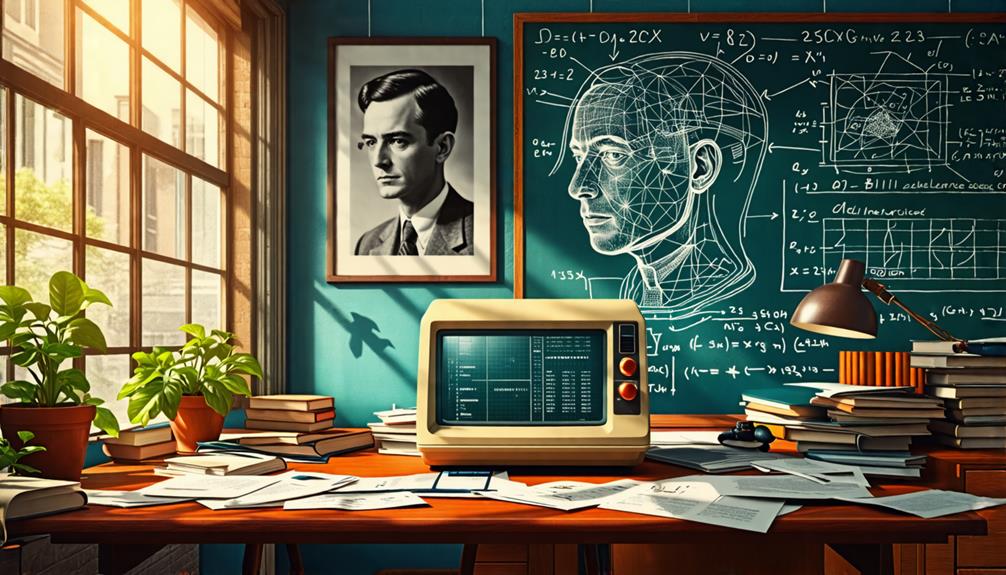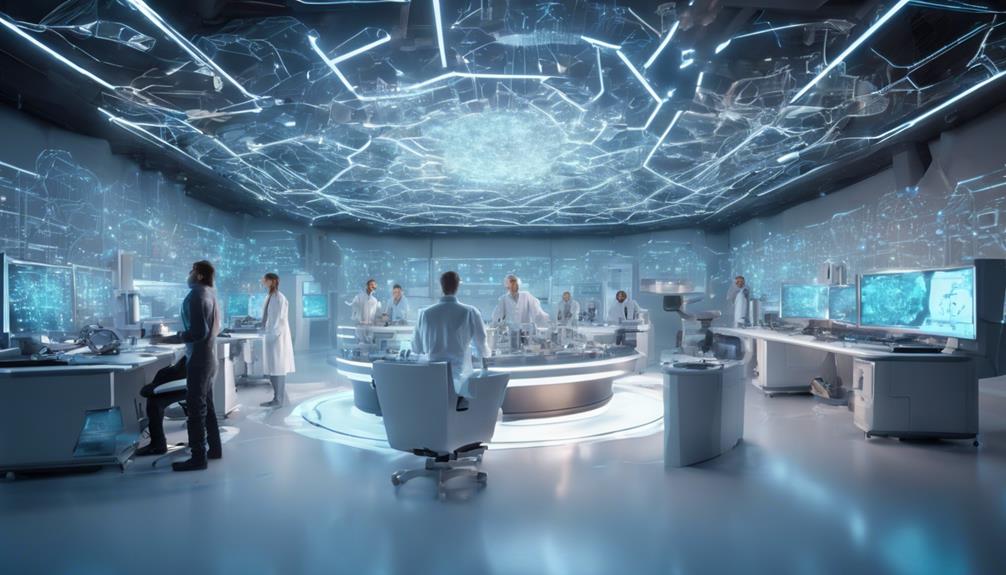
You might often hear Alan Turing hailed as the father of artificial intelligence, and for good reason. His groundbreaking work laid the foundations for modern computing and envisioned machines that could think. Alongside Turing, pioneers like John McCarthy, who coined the term "artificial intelligence" at the influential Dartmouth Conference, and Marvin Minsky's early work on neural networks have also been pivotal. Each contributed uniquely towards shaping what you now recognize as AI. Understanding their roles offers a deeper appreciation of how far AI has come and the possibilities that lie ahead in further uncovering this dynamic field.
Early Concepts of AI

Tracing back to the 1950s, early concepts of AI emerged from the ambition to mimic human intelligence in machines. You'll find this era fascinating because it marked the first time scientists and theorists really considered the possibility of creating intelligent machines. They weren't just dreaming of robots performing manual tasks; they envisioned entities that could think, learn, and evolve.
Imagine the scene: a post-war world, buzzing with new technologies and ideas. Researchers like Alan Turing, who you might know from his work during World War II, started exploring computational theories that could lead to thinking machines. Turing's 1950 paper, 'Computing Machinery and Intelligence,' proposed the idea that machines could simulate human thought processes. This wasn't just about building smarter calculators; it was about crafting something that could potentially reason, make decisions, and even learn from its mistakes.
These pioneers didn't have today's technology; they worked with what were essentially giant electronic brains made of vacuum tubes and punch cards. Yet, they set the groundwork. They asked questions about intelligence and consciousness that you're still pondering today. They weren't just creating technology; they were shaping the future of human understanding.
John McCarthy's Vision
Building on these foundational ideas, John McCarthy introduced a vision that would profoundly shape the evolution of artificial intelligence. He saw AI not just as a tool, but as a fundamental science akin to human intelligence. Imagine a world where machines can reason, solve problems, and even exhibit knowledge that parallels human understanding. That's the future McCarthy envisioned.
You must understand, his ideas were revolutionary at the time. He proposed that machines could use language to solve problems, learn from experiences, and improve over time. This wasn't about simple automation or mechanical tasks; it was about creating systems that could think independently.
He believed in the power of computational logic as a language for AI, suggesting that through precise algorithms, machines could mimic cognitive functions.
His vision extended beyond mere technical feats. He foresaw a society where intelligent machines could assist in educational, medical, and logistical capacities, potentially enhancing human capabilities and addressing complex global challenges.
While his detailed concepts of machine learning and natural language processing were yet to be fully realized during his early years, you're living in a world where many of his predictions have begun to materialize, transforming how you interact with technology every day.
The Dartmouth Conference

In 1956, John McCarthy organized the Dartmouth Conference, marking the birthplace of artificial intelligence as a distinct field. You'd be fascinated to know that this was where the term 'artificial intelligence' was first coined, thanks to McCarthy's vision. Held at Dartmouth College, this pivotal gathering brought together brilliant minds like Marvin Minsky, Nathaniel Rochester, and Claude Shannon, each of whom played a crucial role in shaping what AI has become today.
Imagine being a fly on the wall during those discussions! They debated the possibilities of machines using language, forming abstractions, solving problems, and even improving themselves. It was a bold move, considering the technology of the time was primitive compared to today's standards. Yet, their foundational work set the stage for all modern AI research and development.
The conference was supposed to last six to eight weeks, aiming to discover if machines could simulate every aspect of learning or any other feature of intelligence. While their initial expectations were high, the actual progress was modest. Nevertheless, the Dartmouth Conference ignited a worldwide interest in AI, influencing generations of technologies and researchers. It's why we see AI seamlessly integrated into various aspects of our lives today.
Alan Turing's Legacy
Alan Turing, often hailed as the father of modern computing, profoundly shaped the field of artificial intelligence with his revolutionary ideas. You might know him best for his role in breaking the Enigma code during World War II, but his contributions go far beyond that.
Turing's 1950 paper, 'Computing Machinery and Intelligence,' posed the famous question, 'Can machines think?' This paper not only sparked debate but also laid the groundwork for AI research.
Turing introduced the concept of the Turing Test in this paper, a criterion of intelligence that's still used as a reference in AI discussions today. The test evaluates a machine's ability to exhibit intelligent behavior equivalent to, or indistinguishable from, that of a human.
Turing's ideas didn't just push the boundaries of theoretical thought; they encouraged others to think about machines as potential thinkers, not just calculators.
You're experiencing his legacy every time you use technology that relies on AI. From search engines to voice recognition, Turing's work continues to influence myriad aspects of your digital life. He didn't see all the fruits of his labor, but his vision fundamentally changed how you interact with technology and shaped your understanding of what machines might one day accomplish.
Marvin Minsky's Influence

Marvin Minsky expanded AI's horizons by pioneering work in artificial neural networks and cognitive psychology. His innovative approach laid the groundwork for the complex AI systems you interact with today. Minsky co-founded the MIT Artificial Intelligence Laboratory in 1959, envisioning a future where machines could simulate aspects of human intelligence.
You'd be amazed by Minsky's concept of the 'society of mind,' a theory suggesting that intelligence isn't a single process but a vast orchestration of more straightforward interactions. This idea isn't just academic; it's the backbone of how modern AI tackles complex tasks. By breaking down thought processes into manageable parts, machines can mimic human-like reasoning.
Minsky also delved into the practical applications of AI, influencing robotics and machine perception. His work encouraged a generation of researchers to explore how machines can see, learn, and react to the world around them. His books and papers, rich with insights and ideas, continue to inspire those venturing into AI development.
Think about this: every time you use a device that learns from your preferences or interacts with you conversationally, you're experiencing a part of Minsky's legacy. He didn't just dream about AI; he helped build the foundation that makes your digital world smarter.
Contributions of Claude Shannon
Claude Shannon fundamentally transformed how we understand digital communication and information theory. His groundbreaking work laid the foundational stones of what you now recognize as modern computing and AI.
In the mid-20th century, Shannon introduced the concept of quantifying information with his landmark paper, 'A Mathematical Theory of Communication.' This paper isn't just a cornerstone; it's the blueprint that engineers and scientists have built upon ever since.
You've probably heard of the term 'bit,' short for binary digit, which Shannon coined. This tiny term is monumental. It's the basic unit of information in computing and digital communications, embodying the choice between two alternatives—zero or one, yes or no.
Shannon's insight that information could be broken down into binary units revolutionized not only telecommunications but also storage and retrieval of information, paving the way for data compression and error detection and correction techniques that you rely on every day.
Moreover, Shannon's work extended beyond theoretical constructs. He also dabbled in robotics and artificial intelligence, creating chess-playing machines and electronic devices that could juggle or solve the Rubik's Cube.
Through these inventions, he demonstrated practical applications of his theories, inspiring generations to think about machine learning in new ways.
Impact of Herbert Simon

Herbert Simon significantly shaped the landscape of artificial intelligence and cognitive psychology, impacting how you interact with technology today. His work pioneered the concept that machines could simulate human decision-making processes, a radical idea when he started his research.
You've likely experienced the ripple effects of his theories in various user interfaces and decision-support systems that mimic human thought patterns.
Simon's exploration into the boundaries between human cognition and artificial systems has led directly to tools you use every day. For instance, when you ask your smartphone for directions or receive personalized recommendations from an online store, you're seeing Simon's theories at play. These technologies are built on algorithms designed to approximate the problem-solving techniques he mapped out decades ago.
Moreover, Simon's belief in the possibilities of artificial intelligence encouraged broader acceptance of its practical applications. His foresight and intellectual courage helped pave the way for AI's integration into daily life, making it easier for you to adopt and trust these technologies.
Every time you encounter a piece of smart technology, remember it's not just about coding and algorithms—it's also about Simon's vision of what computers could achieve and how they could enhance human abilities.
AI Research Developments
Recent advancements in AI research have significantly expanded your interaction possibilities with technology. You've likely noticed how virtual assistants are now more intuitive, capable of understanding and processing your requests with remarkable accuracy. This leap in usability isn't just about better voice recognition; it's about sophisticated algorithms that learn from vast amounts of data to predict and respond to your needs more effectively.
Moreover, AI is now better at recognizing images and objects, which enhances everything from security systems to your social media experience. You can unlock your phone with a glance or search for photos with simple descriptions, all thanks to neural networks that mimic the human brain's connectivity.
In healthcare, AI's impact is profound. You're seeing systems that assist in diagnosing diseases from scans with accuracy that sometimes surpasses human experts. These systems learn from each diagnosis, continuously improving their precision.
But it's not just about practical applications. AI is also transforming your entertainment options. Algorithms personalize your viewing and listening experiences by analyzing your preferences to suggest new shows, movies, or music you might enjoy, making your leisure time more enjoyable and tailored to your tastes.
Future Directions in AI

Looking ahead, you'll witness AI becoming increasingly integral to everyday life, seamlessly blending with numerous aspects of your world. From smart homes that anticipate your needs to autonomous vehicles that make your commute safer, AI's capabilities will expand dramatically. You'll find yourself interacting with more intuitive and personalized AI systems, whether it's through improved virtual assistants that understand your preferences or through healthcare bots that provide timely medical advice.
Moreover, AI won't only enhance personal convenience but also revolutionize industries. You'll see it streamline supply chains, increase manufacturing precision, and even drive innovations in sectors like agriculture where it will help in managing resources more efficiently. These advancements will lead to more sustainable practices across the board.
Yet, with these benefits, you'll also need to navigate new challenges. Issues of privacy, security, and ethical use of AI will become more pronounced. You'll have to be proactive in understanding how your data is used and advocate for regulations that protect individual rights without stifling innovation.
In the end, as AI evolves, you'll play a crucial role in shaping its impact. Embracing this technology while remaining vigilant about its implications will be key to leveraging AI responsibly and effectively.
Frequently Asked Questions
How Have AI Applications Evolved in Everyday Consumer Technology?
AI applications in consumer tech have dramatically transformed how you interact with devices. They're smarter, more intuitive, and seamlessly integrated into daily life, enhancing everything from smartphones to home automation systems.
What Are the Ethical Implications of AI Advancements?
You need to consider how AI advancements could infringe on privacy, perpetuate bias, and impact employment. It's crucial to balance innovation with ethical accountability to ensure technology benefits society without causing harm.
How Is AI Influencing Modern Education Systems?
AI is revolutionizing modern education systems by personalizing learning experiences, automating administrative tasks, and providing real-time feedback. You'll see enhanced engagement and improved outcomes as AI tailors content to individual student needs.
What Role Does AI Play in Climate Change Solutions?
AI plays a crucial role in climate change solutions by optimizing energy use, predicting weather patterns, and improving resource management. You'll find it's pivotal in developing sustainable practices and reducing environmental impact.
How Has AI Impacted Job Markets Globally?
AI has significantly reshaped global job markets, automating routine tasks and creating demand for tech-savvy roles. You've likely noticed shifts in employment opportunities, emphasizing the need for continual learning and adaptation.
Conclusion
You've explored the pioneers who dreamt up the realm of artificial intelligence.
From John McCarthy, who coined 'AI' at the Dartmouth Conference, to Alan Turing's foundational theories and Marvin Minsky's innovations.
Each contributed uniquely, weaving a rich tapestry that shapes today's AI landscape.
As you look ahead, remember these giants on whose shoulders modern technology stands.
Their legacy not only illuminates the past but also lights the path for future AI explorations.
Keep pushing boundaries; the next chapter awaits your mark.






